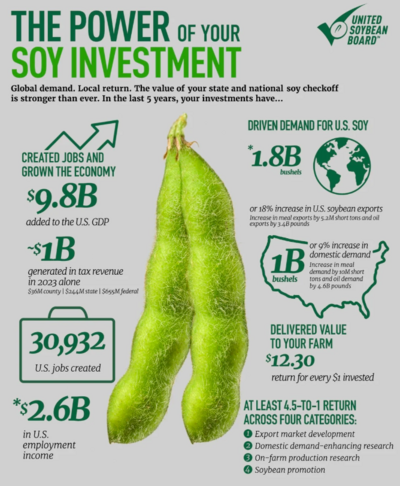Source: United Soybean Board news release
ST. LOUIS — In a challenging economic landscape of low commodity prices and tight margins, the United Soybean Board (USB) continues to deliver economic returns to U.S. soybean farmers through strategic investments. This remains critical to ensure farmers receive measurable value on-farm and through expanded market opportunities. A recent study confirms the soy checkoff’s positive return of at least 4.5-to-1* on investment across the categories of export market development, domestic demand-enhancing research, on-farm production research and soybean promotion.
Beyond growing export markets for food and feed, finding new industrial uses domestically, delivering value for animal agriculture, or disseminating production research to grow a more resilient soybean, the real takeaway from this study is economic value. The soy checkoff creates more jobs, supports higher labor income, increases tax revenue, and has a tremendous impact on U.S. gross domestic product (GDP).
“We focus on maximizing the impact of every dollar invested by creating new revenue streams for farmers, building premium markets, and establishing partnerships here and abroad where farmers can see tangible returns,” said Philip Good, Mississippi farmer and United Soybean Board’s Chair of the Audit & Evaluation Committee. “The soy checkoff is especially important during fluctuating commodity prices to protect our markets that still bring value back to the farm. Like most farmers, we’re feeling the pinch at home. But I’m confident that USB’s priority of strengthening markets and growing demand will help farmers navigate near-term financial challenges. These long-term investments will provide a more sustainable future for their operations.”
The study by Dr. Harry M. Kaiser of Cornell University highlights USB and the QSSB’s return on investment in improving the demand for U.S. soybeans and increasing the efficiency of soybean production. It also provides perspective on the soy checkoff’s significant impact on U.S. employment and income. Cumulatively, soy checkoff-funded initiatives at the national and state level supported nearly 31,000 jobs, added $2.6 billion in labor income, contributed $5.9 billion in total value, and increased the U.S. GDP by $9.8 billion.
“USB’s programs add distinct value to the economy, from supporting job growth to providing tax revenue gains,” said Dr. Kaiser. “When it comes to ROI, I’m most encouraged by the staggering growth in domestic demand research as soybeans seem to have no limits when it comes to versatility and performance in new formulations across industrial uses as well as delivering value for animal agriculture. Exports play a crucial role for U.S. soybeans, with over half of the crop reaching 80+ global markets, underscoring their importance to the industry’s growth and sustainability.”
These findings emphasize the soy checkoff’s continued success in driving economic benefits and ROI for farmers. Every dollar invested returned $12.30 in net revenue to the soybean industry. In addition to fostering new revenue streams on-farm, USB’s efforts in research and promotion create positive spillover effects. Whether it’s increased demand for soybean products, supporting more jobs in agriculture or opening up new export markets to support a prolific harvest, USB and QSSB investments of the half-million U.S. soybean farmers create a stronger foundation for your farm’s future.
“Rest assured, your soy checkoff continues to invest in high-impact opportunities to support U.S. Soy. We’re funding research to fight pests and increase yields, improving waterways, rails and ports, supporting cost share for cover crop adoption, growing demand in emerging, expanding and mature markets abroad, identifying soy uses in petroleum replacement and furthering high oleic utilization across the country,” shared USB’s CEO Lucas Lentsch.
For more information and a broader look into the soybean industry, you can also check out the United Soybean Board and the National Oilseed Processors Association’s study on the economic impact of U.S. soybeans.
About United Soybean Board
United Soybean Board’s 77 volunteer farmer-leaders work on behalf of all U.S. soybean farmers to achieve maximum value for their soy checkoff investments. These volunteers create value by investing in research, education and promotion with the vision to deliver sustainable soy solutions to every life, every day across the three priority areas of Infrastructure & Connectivity, Health & Nutrition, and Innovation & Technology. As stipulated in the federal Soybean Promotion, Research and Consumer Information Act, the USDA Agricultural Marketing Service has oversight responsibilities for USB and the soy checkoff. For more information on the United Soybean Board, visit unitedsoybean.org.




